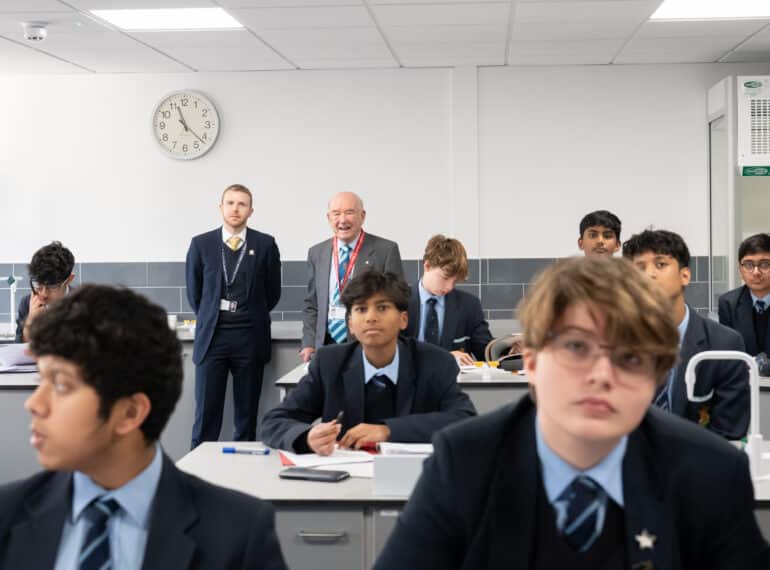
OE benefactor Tony Sherrard (1952-1959) enjoyed the chance to see the fruits of his generosity only a few months after making his substantial donation to the School. His gift was put towards work to completely refurbish two Chemistry laboratories in the Fern Building.
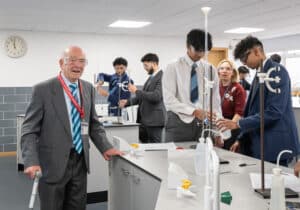 The project went ahead this summer after The Wolfson Foundation (an educational charity) provided its maximum £100,000 grant in January in response to FQE committing significant funds towards the £230K overall cost.
The project went ahead this summer after The Wolfson Foundation (an educational charity) provided its maximum £100,000 grant in January in response to FQE committing significant funds towards the £230K overall cost.
For his part, Tony decided to make his own substantial donation after reading the Headmaster’s article about the project in the Old Elizabethans Association magazine. Tony retired in 1997 after an illustrious career in the chemical and pharmaceuticals industries, so an investment in chemistry facilities was close to his heart.
Accordingly, he brought forward the donation he had planned to make in his will so that the current generation of boys could immediately benefit.
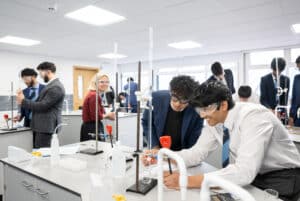 During his visit to the School this term, he called in on lessons in the labs, including a Year 13 practical, speaking to the boys and to Head of Chemistry Amy Irvine. Afterwards, Tony said how pleased he was to see so many taking A-level sciences, and Chemistry in particular.
During his visit to the School this term, he called in on lessons in the labs, including a Year 13 practical, speaking to the boys and to Head of Chemistry Amy Irvine. Afterwards, Tony said how pleased he was to see so many taking A-level sciences, and Chemistry in particular.
Tony keeps in touch with a number of fellow OEs and attends the Forty Society lunches. He now lives in Buckinghamshire.
In his own words: Tony Sherrard
I was born in September 1941 and attended Merryhills Primary school, located between Oakwood and Enfield.
Starting in Eric Shearly’s Form 1C, one of the first group of pupils that benefitted from the three-form entry, I was among the youngest (not yet 11 years of age on entry) and one of the few ‘out-of-county’ pupils, too. Despite winning the form prize in the second year (Form 2C), achieving upper quartile marks in later years, my A-level marks were disappointingly ordinary. Being only 16, I stayed on in the seventh form, but the exam results in 1959 showed little improvement, although the benefit of this extra year was evident at university.
I enjoyed sporting and outdoor activities, and although slightly built and short, I played for the Third XV and Third XI on the rugby field and cricket pitches respectively. I continued to play rugby for: the OEs (occasionally in the university holidays); Mumbles RFC, a feeder Club for Swansea; and Furness RFC in Barrow-in-Furness.
During my QE years, I was involved with the gym club’s presentation at the hobbies exhibition, played chess, collected stamps and developed an interest in photography. School and Scouting supported my interest in photography and rambling/fell-walking respectively, both of which remain an interest to this day.
Following external careers advice, I chose to study Chemical Engineering at the University College of Swansea, that benefitted from project work in the local heavy industries, securing a B.Sc degree and an opportunity to pursue a doctorate on techniques used in the oil and pharmaceutical industries. So, in 1965 I completed my PhD and took a job with Glaxo Laboratories at its factory on the southern coast of the Lake District. This factory was a Primary Production unit, manufacturing bulk active ingredients for prescription medicines, including antibiotics and fine chemicals. It provided excellent experience, which involved optimising and troubleshooting the various processes and equipment, designing new chemical processes, and developing solvent recovery systems. In the first ten years at Glaxo, I also managed an antibiotic extraction plant in County Durham and was part of a commissioning team at a new factory near Newcastle.
In preparation for a senior role in a new factory in SW Scotland, I spent time gaining more experience of operating fine chemicals plant in eastern Scotland. So, I became Factory Manager of the small new factory during the completion of construction, the commissioning and the initial production phases in 1977-81. From there, I was appointed Production & Technical Director in Glaxo Australia, responsible for three factories in Tasmania and Victoria – two small ones manufacturing opiates and the other in Melbourne producing prescription medicines predominantly for the Australian market. My contract ran out after three-and-a-half years and I returned to the large UK factory in South Cumbria. Here, initially, I had responsibility for the chemical processes, with the output dominated by antibiotics; later I was promoted to Factory Manager, responsible for the 24/7 day-to-day operations and for developing long-term plans for the factory within the framework of the Glaxo Group’s available Primary Production facilities. After five years (1989-94) in this demanding role, and having spent approximately 20 years working on the edge of Lake District, I moved to a head office role. Here, I became involved in developing the manufacturing strategy for bulk actives ingredients following the merger of Glaxo and Wellcome. With inevitable duplication of skills in the merger, I decided to take redundancy/early retirement at the end of 1997, after more than 32 years in manufacturing for Glaxo, and, latterly, Glaxo-Wellcome.
Shirley and I married more than 50 years ago, and she was a great support as we moved with my career. We have one daughter who also pursued a career in chemical engineering (working for BP for eighteen years and now teaching Physics to A-level,) and one granddaughter. Golf, travel, and charity work within the Rotary umbrella have been key activities in retirement, although health issues have restricted these in the last few years.
Dr Anthony John Sherrard C Eng, MIChemE
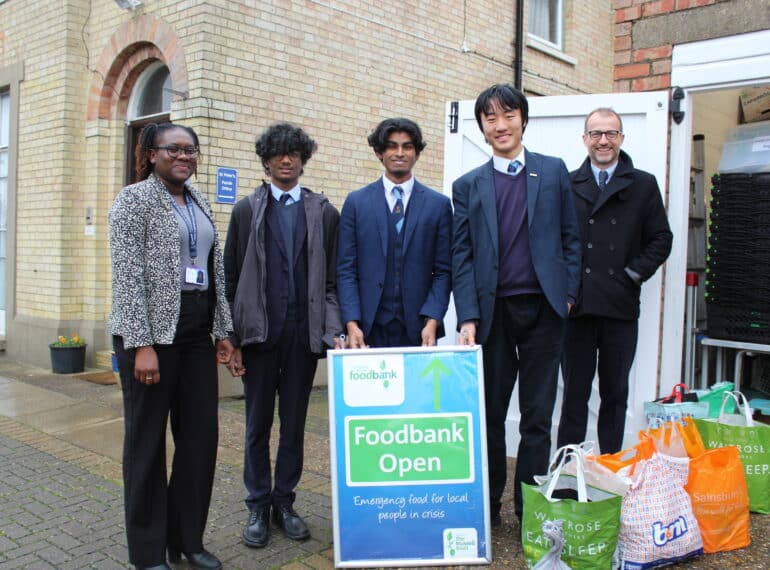
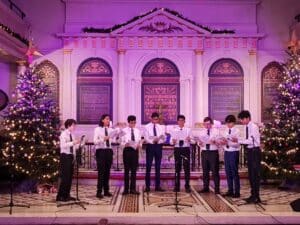 The QE Barbershop group gave their first-ever performance of a full programme of music in a fundraising concert in central London for the Family Action charity.
The QE Barbershop group gave their first-ever performance of a full programme of music in a fundraising concert in central London for the Family Action charity. The delivery of the donations came at the end of a run-up to Christmas that has included boys tucking into a traditional Christmas dinner – with vegetarian options available.
The delivery of the donations came at the end of a run-up to Christmas that has included boys tucking into a traditional Christmas dinner – with vegetarian options available.
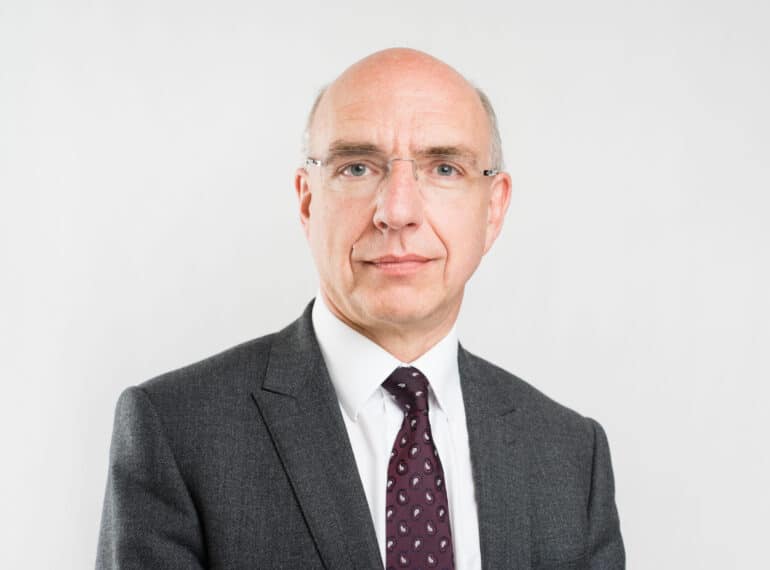
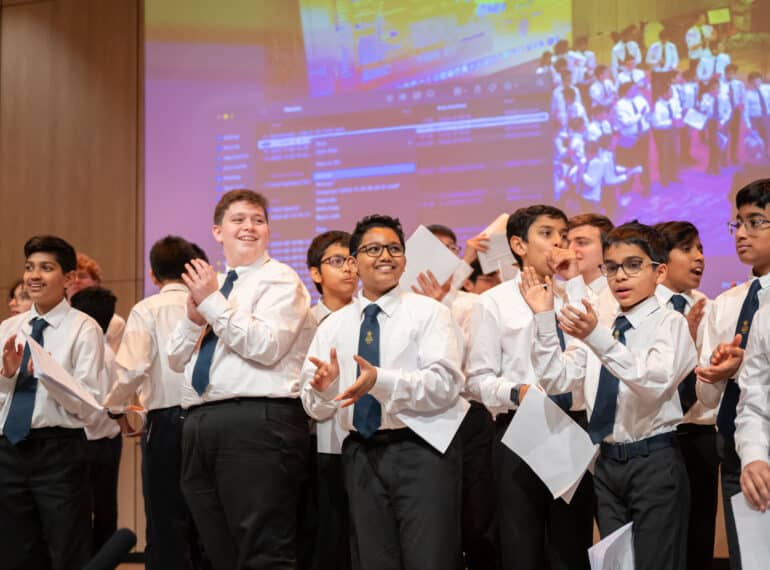
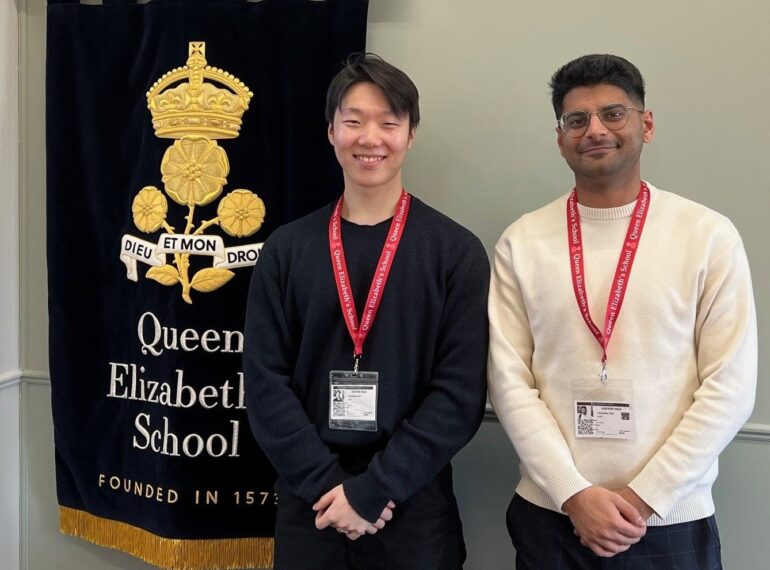
 “We’ve always wanted to try to democratise education,” says Kavi. “Medly AI was born from the vision of making quality education accessible and personalised through the power of AI. Both Paul and I noticed throughout our education how people often had advantages from their socio-economic background in terms of educational resources (e.g personal tuition): both of us come from backgrounds that didn’t allow us access to these resources. Recognising the gaps in traditional educational systems due to work pressures on teachers and staffing issues, we saw the potential of AI to fill these gaps and therefore conceptualised a platform that could act as a personal tutor, examiner, and classroom assistant, all integrated into one user-friendly interface.”
“We’ve always wanted to try to democratise education,” says Kavi. “Medly AI was born from the vision of making quality education accessible and personalised through the power of AI. Both Paul and I noticed throughout our education how people often had advantages from their socio-economic background in terms of educational resources (e.g personal tuition): both of us come from backgrounds that didn’t allow us access to these resources. Recognising the gaps in traditional educational systems due to work pressures on teachers and staffing issues, we saw the potential of AI to fill these gaps and therefore conceptualised a platform that could act as a personal tutor, examiner, and classroom assistant, all integrated into one user-friendly interface.”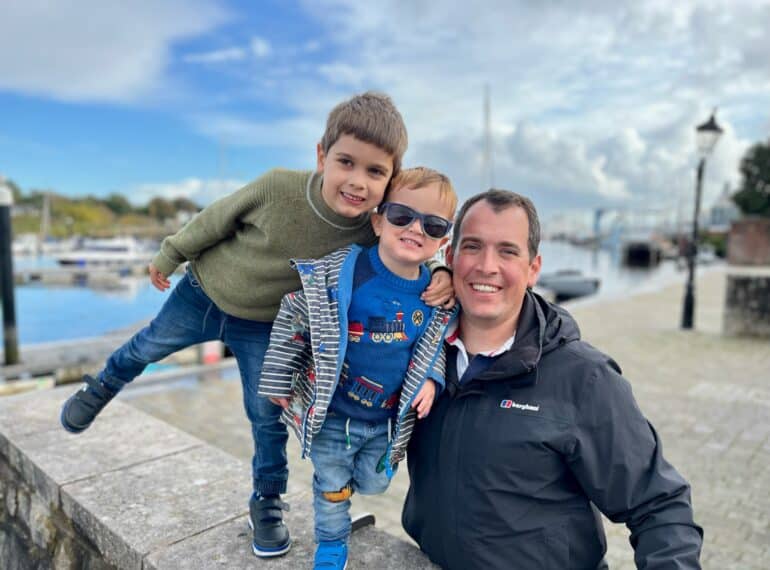
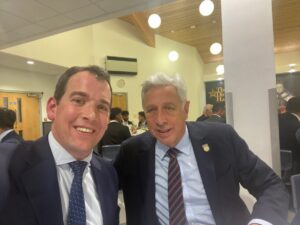 He combines globe-trotting on business with time spent with his young family in beautiful rural Suffolk. Yet, he says, without QE, “I would not have the skills or education to have the life I currently live. I received the invitation for the 450 Club and wanted to give something back.”
He combines globe-trotting on business with time spent with his young family in beautiful rural Suffolk. Yet, he says, without QE, “I would not have the skills or education to have the life I currently live. I received the invitation for the 450 Club and wanted to give something back.”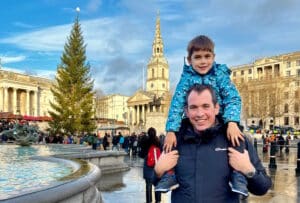 Boortmalt has 27 malting locations worldwide, with a total production of 3 million tonnes of malt – a key ingredient in both beer and whisky. “We supply brewers and distillers from the big global [players] to local and craft scales. I am responsible for the global account management for several of the world’s largest brewers, in addition to local responsibility in the UK and North America. Roughly 50% of my time is spent travelling, either meeting with customers, or visiting our production sites, or Antwerp HQ. In the past 18 months I have visited: Belgium, France, Spain, Germany, The Netherlands, Ireland, Scotland, Switzerland, Vietnam, Canada, USA and Australia for work.
Boortmalt has 27 malting locations worldwide, with a total production of 3 million tonnes of malt – a key ingredient in both beer and whisky. “We supply brewers and distillers from the big global [players] to local and craft scales. I am responsible for the global account management for several of the world’s largest brewers, in addition to local responsibility in the UK and North America. Roughly 50% of my time is spent travelling, either meeting with customers, or visiting our production sites, or Antwerp HQ. In the past 18 months I have visited: Belgium, France, Spain, Germany, The Netherlands, Ireland, Scotland, Switzerland, Vietnam, Canada, USA and Australia for work.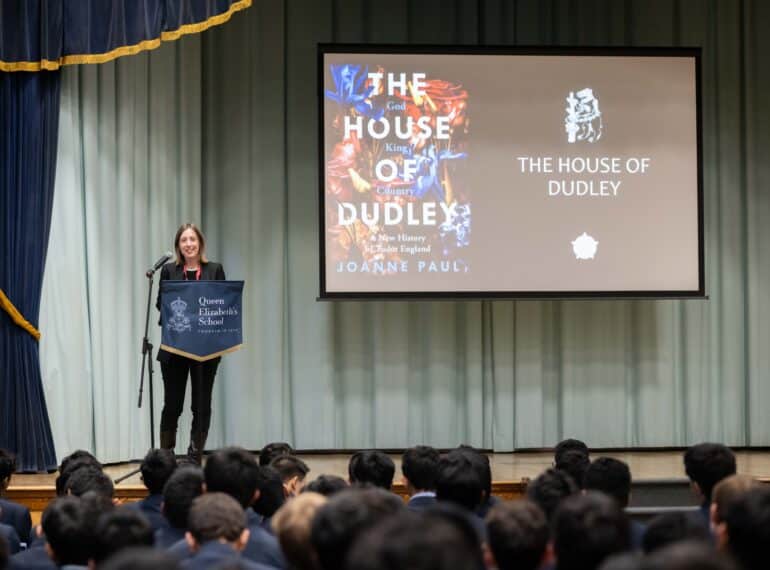
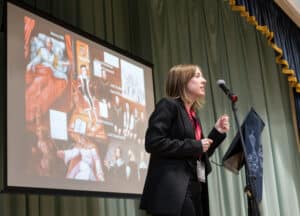 Dr Paul, author of the acclaimed 2022 book, The House of Dudley, delivered a lecture assembly to Years 8 & 9, before conducting a source-based workshop to A-level historians.
Dr Paul, author of the acclaimed 2022 book, The House of Dudley, delivered a lecture assembly to Years 8 & 9, before conducting a source-based workshop to A-level historians.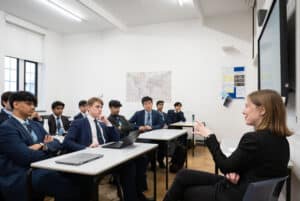 Headmaster Neil Enright said: “We are tremendously grateful to Dr Paul for giving us her time and providing these insights into the family as we wrap up our anniversary year. It seems clear that without the Dudleys, not only would Queen Elizabeth’s School not exist, but neither would the Tudors – or not as we know them, in any case.”
Headmaster Neil Enright said: “We are tremendously grateful to Dr Paul for giving us her time and providing these insights into the family as we wrap up our anniversary year. It seems clear that without the Dudleys, not only would Queen Elizabeth’s School not exist, but neither would the Tudors – or not as we know them, in any case.”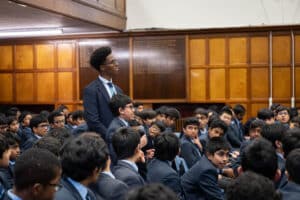 John Dudley’s success in building up the Royal Navy, as Admiral of the Fleet. He prepared it for the successes it was to enjoy in the second half of the 16th century. He added to the fleet and to the armoury, while developing Portsmouth as a great port. His military experience and leadership were important at the 1545 Battle of the Solent against the French, which, Dr Paul said, was a greater threat to England than the later Spanish Armada. John Dudley was nearly on the Mary Rose, which famously sank, but had moved across to the larger Great Harry with the king, Henry VIII.
John Dudley’s success in building up the Royal Navy, as Admiral of the Fleet. He prepared it for the successes it was to enjoy in the second half of the 16th century. He added to the fleet and to the armoury, while developing Portsmouth as a great port. His military experience and leadership were important at the 1545 Battle of the Solent against the French, which, Dr Paul said, was a greater threat to England than the later Spanish Armada. John Dudley was nearly on the Mary Rose, which famously sank, but had moved across to the larger Great Harry with the king, Henry VIII. The boys asked many questions. One wondered why so many grammar schools like QE were established under Elizabeth. Because, Dr Paul said, men such as Robert Dudley and William Cecil, her chief adviser, had received a humanist education and sought to spread that widely. Another asked why Henry VIII had had Edmund killed, given that he had brought so much money into royal coffers. She concluded that Henry probably had no personal animus against him, but that Edmund’s unpopularity made his death a good political move.
The boys asked many questions. One wondered why so many grammar schools like QE were established under Elizabeth. Because, Dr Paul said, men such as Robert Dudley and William Cecil, her chief adviser, had received a humanist education and sought to spread that widely. Another asked why Henry VIII had had Edmund killed, given that he had brought so much money into royal coffers. She concluded that Henry probably had no personal animus against him, but that Edmund’s unpopularity made his death a good political move.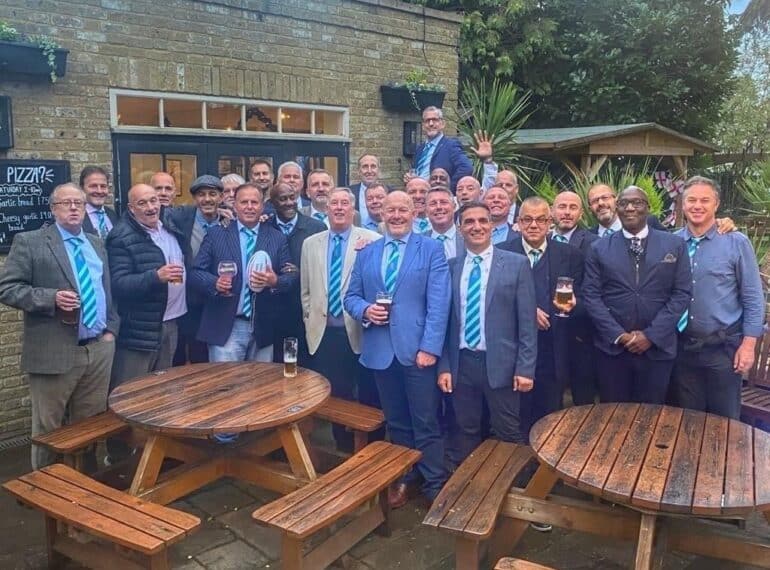
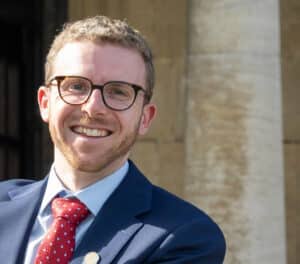 Matthew is Head of External Relations, Executive Assistant to the Headmaster, and Clerk to the Governing Body. “It was a good-humoured and lively atmosphere, with old friends enjoying each other’s company very much the point of the gathering,” he said. “I talked about the School’s 450th anniversary year, some of the different projects that had been undertaken and my role within them – hopefully giving a mildly entertaining insight. Alongside this, I encouraged them to remain connected, or re-connect, with the School, and explained that they are always welcome.”
Matthew is Head of External Relations, Executive Assistant to the Headmaster, and Clerk to the Governing Body. “It was a good-humoured and lively atmosphere, with old friends enjoying each other’s company very much the point of the gathering,” he said. “I talked about the School’s 450th anniversary year, some of the different projects that had been undertaken and my role within them – hopefully giving a mildly entertaining insight. Alongside this, I encouraged them to remain connected, or re-connect, with the School, and explained that they are always welcome.”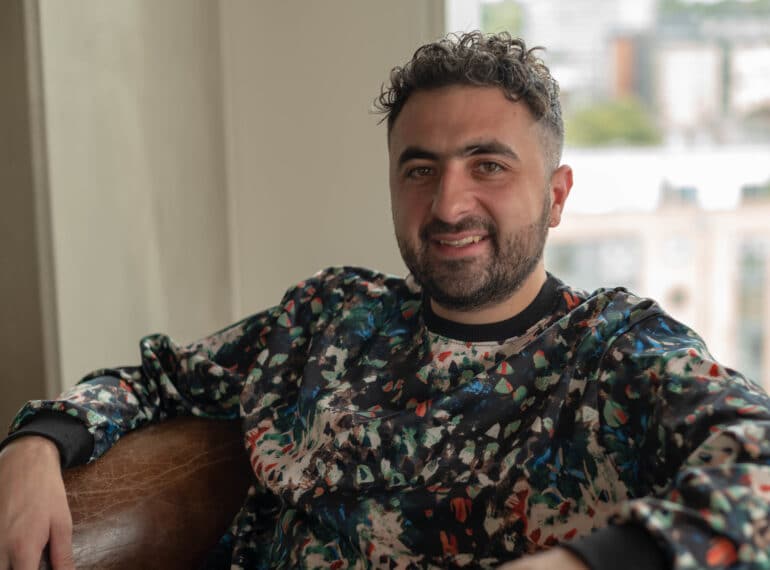
 In his new book, The Coming Wave: Technology, Power and the 21st Century’s Greatest Dilemma, Mustafa argues that in the coming decade powerful new technologies will create immense prosperity, but also threaten the nation-state, the foundation of global order.
In his new book, The Coming Wave: Technology, Power and the 21st Century’s Greatest Dilemma, Mustafa argues that in the coming decade powerful new technologies will create immense prosperity, but also threaten the nation-state, the foundation of global order.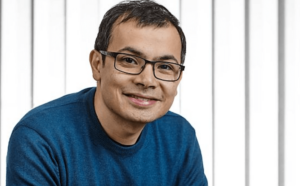 Demis has long been an influential voice on AI. Through a recent New York Times interview, it emerged that he had left Elon Musk “speechless” in 2012 by pointing out a flaw in Musk’s plans to colonise Mars – the risk that if AI were to surpass human intelligence, it could follow humanity to the red planet and pose a threat there as well.
Demis has long been an influential voice on AI. Through a recent New York Times interview, it emerged that he had left Elon Musk “speechless” in 2012 by pointing out a flaw in Musk’s plans to colonise Mars – the risk that if AI were to surpass human intelligence, it could follow humanity to the red planet and pose a threat there as well.
 The project went ahead this summer after The Wolfson Foundation (an educational charity) provided its maximum £100,000 grant in January in response to FQE committing significant funds towards the £230K overall cost.
The project went ahead this summer after The Wolfson Foundation (an educational charity) provided its maximum £100,000 grant in January in response to FQE committing significant funds towards the £230K overall cost. During his visit to the School this term, he called in on lessons in the labs, including a Year 13 practical, speaking to the boys and to Head of Chemistry Amy Irvine. Afterwards, Tony said how pleased he was to see so many taking A-level sciences, and Chemistry in particular.
During his visit to the School this term, he called in on lessons in the labs, including a Year 13 practical, speaking to the boys and to Head of Chemistry Amy Irvine. Afterwards, Tony said how pleased he was to see so many taking A-level sciences, and Chemistry in particular.